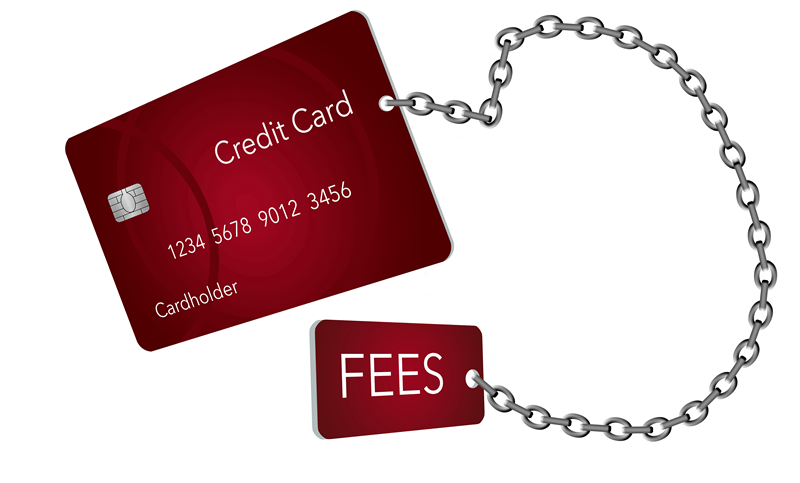
Credit cards can be incredibly useful tools for building credit, earning rewards, and managing cash flow. But while they offer convenience and rewards, they can also come with a long list of credit card fees subtly chipping away at your money. The worst part? Many of these hidden credit card fees are buried in the fine print that you might not even realize you're paying.
Understanding what they are, how they work, and most importantly, how to avoid card fees can help you save hundreds of dollars a year. Here is a rundown of ten of the most common credit card fees you'll likely incur—and practical tips for putting a stop to them.
The annual fee is one of the most straightforward and noticeable credit card fees. Many annual fee cards charge anywhere from $95 to $550 or more each year simply for the privilege of keeping the card open. These cards often come with valuable perks like travel rewards, airport lounge access, or cash-back bonuses, but if you’re not using those benefits enough, you’re likely losing money.
How to Stop Paying It:
Late payment fees are among the most frustrating credit card fees, and they can have lasting consequences. Being overdue by even one day can result in a penalty fee of $30 to $40. Worse still, repeated late payments can cause your interest rate to spike and damage your credit score.
How to Stop Paying It:
If you travel abroad or shop online internationally, you have likely already paid foreign transaction fees without even realizing it. Foreign transaction fees are credit card fees that typically cost 2% to 3% of each purchase made in a foreign currency or abroad. These sneaky credit card fees can truly accumulate with time if you travel a great deal or shop frequently from international retailers.
How to Stop Paying It:
Another tip: when shopping abroad, always choose to pay in the foreign currency rather than U.S. dollars through credit card dynamic currency conversion—those conversions typically have their own hidden credit card fees.
A balance transfer can be an excellent method for managing debt—moving what you owe from one card to another with a lower interest rate. But this convenience comes at a cost: most cards charge a balance transfer fee of 3% to 5% of the amount moved. That would cost you up to $250 to transfer $5,000 of debt.
How to Stop Paying It:
It might be tempting to cash a credit card advance in an emergency, but it's one of the most expensive things you can do. The cash advance fee can range from 3% to 5% of the amount you withdraw, and the interest charges start immediately—there is no grace period. Furthermore, the interest rate on cash advances is usually much higher than for regular purchases.
How to Stop Paying It:
Understanding how not to pay card fees starts with an understanding of what triggers them—and cash advances are among the most costly.
Less common today, yet still a potential threat if you spend more than your credit limit, is the over-limit fee. Even after you've opted in to allow over-limit transactions, you can be charged $25 to $35 each time you exceed your limit. This type of fee often ranks as one of the hidden credit card fees because many cardholders do not realize they've opted in until afterward.
How to Stop Paying It:

If you're late with a payment, or if the payment is returned because you have insufficient funds or an account that's been closed, your card issuer might charge you a returned payment fee. Credit card fees run in the range of $25 to $40. They're frustrating because they're on top of any late payment fee you'll be charged if the payment isn't made on time.
How to Stop Paying It:
Being proactive with your payments is one of the greatest ways to avoid card fees in every category.
Others add family members as authorized users to help them build credit or share rewards. Some cards do charge an extra fee for this perk, however. Credit card fees for this can range from $50 to $200 per user on some annual fee cards. They're typically buried in the fine print and easy to miss.
How to Stop Paying It:
When you lose your credit card, have it stolen, or damage it, you might be assessed a card replacement fee. Some issuers replace cards for free, but others charge you for rush processing or expedited shipping. These credit card fees are small—only $10 to $25—but unnecessary nonetheless.
How to Stop Paying It:
Beyond the broad categories, there are a host of hidden credit card fees that can surprise consumers. These can range from inactivity fees for not using your card often enough, paper statement fees, or even membership add-ons you didn't know you enrolled in. Some travel cards carry extra charges for benefits like concierge services or specialty insurance programs.
How to Stop Paying It:
Credit cards are handy financial tools in the proper hands—unwary, credit card fees can quietly drain your funds. Most people pay at least some of these fees each year, often without realizing that they could have been evaded.
What you should remember is:
The secret to knowing how not to pay card fees is vigilance. Read your terms and conditions, keep an eye on your payment dates, and choose credit cards that work with your lifestyle. If you travel frequently, choose a no-foreign-fee card. If you are building credit, choose no-annual-fee cards.
By following some easy, considerate precautions, you can enjoy all the advantages of credit cards—without paying unnecessary credit card fees. Every dollar you save by not paying these fees is a dollar you can apply to your goals, your savings, or your next reward redemption.
In short, the best strategy is simple: be aware of what you're being charged, dispute every charge, and watch out for the sneaky credit card fees that can accumulate over time. Knowing how to sidestep card fees, you're not just managing plastic—you're managing your financial future. The information mentioned here may be incorrect or vary, as internet information is constantly changing. Please cross-check before relying on it.
This content was created by AI